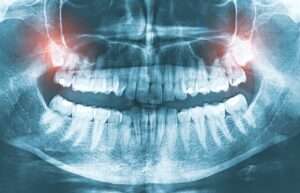
The human body consists of sophisticated, complex systems, organs, and parts that work together to keep them alive. Yet, it isn’t always perfect as it is. For example, why has pretty much everyone you know already had or will need to have their wisdom teeth removed? If no one needs them, why are these third molars there in the first place? Here are some enlightening reasons.
Reason #1: Our Ancient Ancestors Ate a Rough Diet.
Thousands of years ago, humans ate quite differently than most modern societies today. Their cooking methods were limited to fire roasting, which means their jaws had to be very robust and large to handle the food available to them. Back then, they had mostly tough, raw vegetables, seeds, nuts, and dense meat.
Today, we have microwaves, stoves, running water, ovens, slow cookers, air fryers, and other tools and technology to make food softer. Plus, with the advent of more processed food, our diets are obviously much easier to chew without a larger jawbone. From generation to generation, the human jawbone shrank, and not all teeth fit neatly in the arches anymore. In fact, most humans don’t have space for this third set of adult teeth because of this evolutionary change.
Reason #2: Forks, Spoons, and Knives Were Created.
As technology improved with humans, utensils came onto the scene, accelerating evolution of the jawbone and teeth. Instead of biting and cutting into food into manageable pieces with their teeth, people could then utilize forks and knives, which meant less work for their jaws. As a result, the human jawbone didn’t need to be as strong or big as it once was.
Reason #3: Dental Hygiene Is Still Pretty New.
In the more recent past, i.e., over the last several hundred years, humans more commonly experienced tooth decay and loss. In fact, by the time a teenager reached adulthood, or the age of perceived “wisdom,” their third set of molars came in handy to replace teeth had already succumbed to cavities and rot.
In the early to mid-1900s, however, standards for dental hygiene changed dramatically to improve breath and oral health. Brushing and flossing teeth became a daily, or at least a regular, habit. Although more than 120 million Americans today still have at least one missing tooth, premature loss is much less prevalent than it once was. This lower rate also results from public water supplies in America having fluoride added, a mineral that strengthens enamel.
Reason #4: Evolution or Change Takes Time.
Compared to some other species, humans have a relatively long lifespan. Going from generation to generation can take decades, and several generations may have to pass before seeing significant changes in features. From the time of ancient humans until now, wisdom teeth have lost their purpose and necessity, but the body still produces them. Evolutionary biologists often refer to these teeth as vestigial organs because most humans now do not need them anymore.
Given enough time and advancements, perhaps wisdom teeth will disappear from the human body entirely. However, until then, most wisdom teeth must be removed to allow space for the rest of the teeth in a person’s mouth. If this is the case for you, don’t worry! It’s better to take them out and embrace the way your body has evolved than leave these molars in and experience pain, shifting teeth, and oral decay and disease. After all, you’re only human!
About the Practice
Williamsburg Dental is a staple local business in Lincoln. With six locations to choose from, patients from all over the area can find an office nearby. Our team offers comprehensive services, including more advanced treatments like dental implant placement, wisdom tooth extraction, and more. If you would like to schedule an appointment for you or a family member, just reach out to your preferred location here.
